#certificationTraining
Text
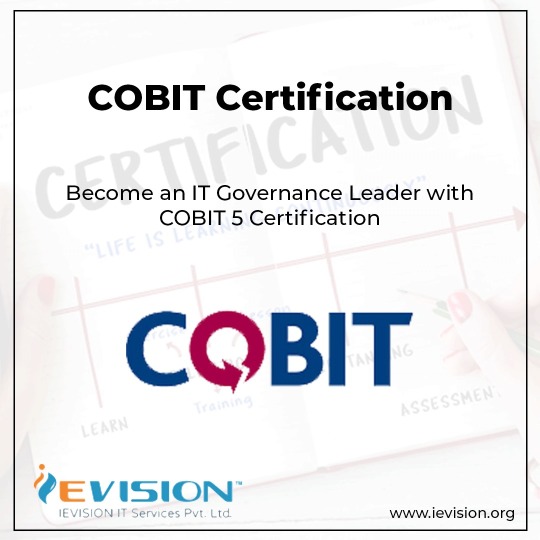
Become an IT Governance Leader with COBIT 5 Certification
COBIT Certification Training: Elevate Your IT Governance Skills
Effective IT governance is crucial for organizational success in today's rapidly evolving digital landscape. COBIT 5, a comprehensive framework for developing, implementing, monitoring, and improving IT governance and management practices, is pivotal for aligning IT with business goals. At iEvision, our COBIT Certification Training is designed to equip you with the skills and knowledge necessary to leverage COBIT 5 and achieve excellence in IT governance.
What Are the Benefits of This Course?
Our COBIT Certification Training offers a myriad of benefits tailored to enhance your expertise in IT governance:
Deep Understanding of COBIT 5: Gain in-depth knowledge of the COBIT 5 framework, including its principles, processes, and best practices for IT governance.
Enhanced Career Prospects: COBIT certifications are highly valued in the IT industry. Certification can open doors to advanced career opportunities and higher earning potential.
Improved IT Governance: Learn how to apply COBIT 5 principles to effectively manage IT resources, mitigate risks, and ensure compliance with regulatory requirements.
Practical Application: Our training is designed with real-world scenarios and case studies, providing you with practical skills that can be immediately applied in your organization.
Why Use COBIT 5?
COBIT 5 is renowned for its ability to help organizations bridge the gap between IT and business objectives. By incorporating COBIT 5 into your IT governance strategy, you can achieve:
Alignment with Business Goals: Ensure IT initiatives support and drive your organization’s strategic objectives.
Efficient Resource Management: Optimize the use of IT resources and reduce operational costs.
Enhanced Risk Management: Identify and address potential IT risks before they impact your business.
Regulatory Compliance: Meet industry standards and regulatory requirements with confidence.
Who Should Attend?
Our COBIT Certification Training is ideal for professionals who are involved in IT governance, management, and operations. This includes:
IT Managers and Directors: Enhance your ability to oversee and manage IT functions effectively.
Governance Professionals: Gain the knowledge needed to implement and sustain governance frameworks.
Auditors and Compliance Officers: Understand how COBIT 5 can help in auditing and ensuring compliance.
Consultants: Expand your expertise to offer more comprehensive IT governance solutions to your clients.
Conclusion
Investing in COBIT Certification Training with iEvision is a strategic move for any IT professional looking to excel in governance and management. With our expert-led courses and practical insights into COBIT 5, you’ll be well-equipped to drive IT excellence in your organization. Join us today and take the next step towards mastering IT governance with COBIT certifications!
#COBIT5#COBITCertification#ITGovernance#ITManagement#CertificationTraining#CareerAdvancement#ProfessionalDevelopment#ITStrategy#GovernanceFramework#ITSkills
0 notes
Text
How to Effectively Leverage JIRA for Project Management Training in 2024?
JIRA, developed by Atlassian, is one of the most powerful and versatile tools available for project management, particularly in Agile environments. Originally designed for software development, JIRA has expanded its capabilities to support a wide range of projects across different industries. Whether you’re managing a small team or overseeing a complex project with multiple stakeholders, effectively leveraging JIRA can significantly enhance your project management processes. Here’s how you can maximize the benefits of JIRA through comprehensive Jira project management training.
Understand the Core Concepts
Before diving into the advanced features of JIRA, it’s crucial to build a strong foundation by understanding its core concepts. JIRA revolves around key elements like projects, issues, boards, and workflows. Projects are the main containers for your work, issues represent tasks or bugs that need to be addressed, boards visualize the progress of work, and workflows define the steps An issue is resolved from beginning to end.
Effective training should start by familiarizing you with these fundamental components. Understanding how they interact will enable you to navigate JIRA with confidence and use it to its full potential.

Customize JIRA to Fit Your Project Needs
One of JIRA’s greatest strengths is its flexibility. It can be customized to fit the unique needs of your projects and teams. During your training, focus on learning how to tailor JIRA’s settings to match your specific workflows and processes.
You can customize workflows to reflect the steps your team takes to complete tasks, create custom issue types to categorize work more effectively, and set up personalized dashboards that give you a real-time overview of your project’s status. By customizing JIRA, you ensure that the tool aligns with your team’s way of working, which can lead to greater efficiency and better project outcomes.
Leverage Agile Boards
JIRA is particularly well-suited for Agile project management, offering both Scrum and Kanban boards to help teams visualize their work and manage projects in an Agile manner. Teams that operate in sprints would benefit from Scrum boards, whereas teams that prioritize continuous delivery would benefit from Kanban boards.
Training should include hands-on experience with setting up and managing these boards. Learn how to create sprints, manage backlogs, prioritize tasks, and track progress. Understanding how to effectively use Agile boards in JIRA will help you improve your team’s workflow, enhance collaboration, and ensure that projects are delivered on time.
Utilize JIRA’s Reporting and Analytics Tools
Effective project management relies heavily on data-driven decisions. JIRA offers robust reporting and analytics tools that allow you to track your project’s progress, identify bottlenecks, and measure team performance. Training should cover how to generate and interpret reports like burndown charts, velocity charts, and cumulative flow diagrams.
These tools provide valuable insights into how your project is progressing and where improvements can be made. By leveraging JIRA’s reporting features, you can make informed decisions that keep your projects on track and ensure that your team is performing at its best.
Automate Repetitive Tasks
Automation is a key feature in JIRA that can save you and your team a significant amount of time. Through training, you should learn how to set up automation rules that handle repetitive tasks, such as moving issues through workflows, assigning tasks, or sending notifications when certain conditions are met.
Automation not only reduces the manual effort required to manage projects but also minimizes the risk of errors. By automating routine tasks, your team can focus more on value-added activities, which can lead to higher productivity and better project outcomes.
Integrate JIRA with Other Tools
JIRA’s ability to integrate with a wide range of other tools is another reason it’s so effective for project management. Whether it’s linking with Confluence for documentation, integrating with Bitbucket or GitHub for code management, or connecting with Slack for communication, these integrations can streamline your workflow and enhance collaboration.
Training should include how to set up and manage these integrations, ensuring that all your project management tools work together seamlessly. This interconnectedness can significantly boost your team’s efficiency by reducing the need to switch between different platforms and ensuring that all project-related information is easily accessible.
Encourage Continuous Learning and Feedback
Finally, it’s important to recognize that mastering JIRA is an ongoing process. Encourage continuous learning by keeping up with the latest updates and features that Atlassian introduces to JIRA. Additionally, seek feedback from your team on how JIRA is working for them and where improvements can be made.
By fostering a culture of continuous improvement, you can ensure that your team remains effective in leveraging JIRA for project management and continues to deliver high-quality results.
Conclusion
Effectively leveraging JIRA for project management requires a solid understanding of its core features, the ability to customize it to your team’s needs, and the use of its powerful Agile boards, reporting tools, automation features, and integrations. Through comprehensive training, you can master these aspects of JIRA and use it to streamline your project management processes, enhance collaboration, and deliver successful projects. By committing to continuous learning and improvement, you’ll be well-equipped to maximize the benefits that JIRA offers for managing projects of any size or complexity.
0 notes
Text

#rite academy#rite academy in hyderabad#mep#best mep#riteacademytraininginstitute#certificationtraining#traininganddevelopment
0 notes
Text
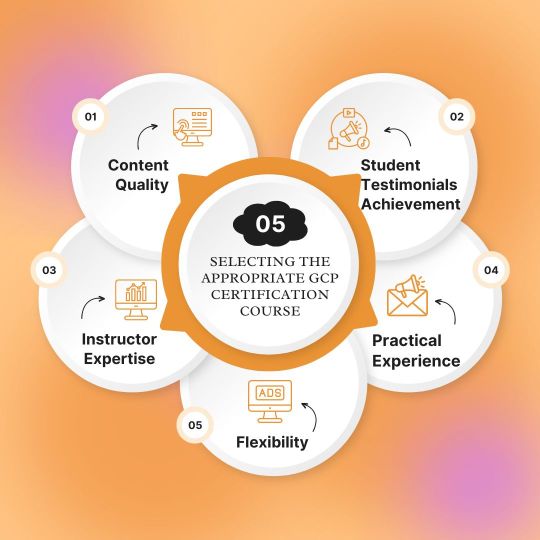
0 notes
Text
The Complete Guide to DevOps Certification Training Programs, "Mastering DevOps"
Introduction:
In today's fast-paced tech world, DevOps has emerged as a crucial methodology for streamlining software development and deployment processes. With its emphasis on collaboration, automation, and continuous integration/continuous deployment (CI/CD), DevOps has become the backbone of many successful tech companies. As a result, professionals with DevOps skills are in high demand, making DevOps certification training courses an attractive option for those looking to enhance their career prospects.
Understanding DevOps
Before delving into the details of DevOps certification training courses, let's first understand what DevOps is all about. DevOps is a cultural and professional movement that focuses on fostering collaboration between software development (Dev) and IT operations (Ops) teams. It aims to automate the process of software delivery and infrastructure changes while ensuring reliability and stability.
DevOps practices include continuous integration, continuous delivery, automated testing, infrastructure as code, and monitoring and logging. By adopting DevOps principles, organizations can accelerate the pace of software development, improve the quality of their products, and respond more quickly to customer feedback and market changes.
What is a DevOps Certification Course?
A DevOps certification course is designed to equip professionals with the knowledge and skills needed to implement DevOps practices effectively within their organizations. These courses cover a wide range of topics, including DevOps principles, methodologies, tools, and best practices. They are typically offered by training providers, educational institutions, and online learning platforms.
Benefits of DevOps Certification
There are several benefits to pursuing a DevOps certification course:
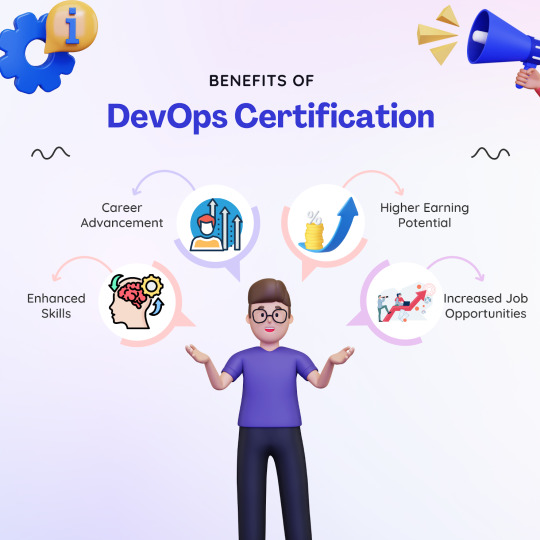
1. Enhanced Skills:
DevOps certification courses provide participants with a comprehensive understanding of DevOps principles and practices, as well as hands-on experience with relevant tools and technologies.
2. Career Advancement:
DevOps professionals are in high demand, and holding a DevOps certification can significantly enhance your career prospects. It demonstrates your commitment to continuous learning and professional development.
3. Higher Earning Potential:
According to industry reports, DevOps professionals command higher salaries compared to their non-certified counterparts. Holding a DevOps certification can help you negotiate better compensation packages.
4. Increased Job Opportunities:
Many organizations now require DevOps expertise for their software development and IT operations roles. Holding a DevOps certification can open up new job opportunities and expand your professional network.
Types of DevOps Certification Courses
There are several types of DevOps certification courses available, catering to different skill levels and career objectives:
1. Foundational Courses:
These courses provide an introduction to DevOps principles, practices, and tools. They are suitable for beginners or those looking to gain a basic understanding of DevOps concepts.
2. Practitioner Courses:
These courses are designed for professionals who already have some experience with DevOps and want to deepen their knowledge and skills. They typically cover advanced topics such as CI/CD pipelines, containerization, and infrastructure as code.
3. Specialized Courses:
These courses focus on specific aspects of DevOps, such as cloud-native DevOps, DevSecOps (integrating security into DevOps practices), or site reliability engineering (SRE). They are suitable for professionals looking to specialize in a particular area of DevOps.
4. Vendor-Specific Courses:
Some DevOps certification courses are offered by specific vendors or technology providers, such as AWS, Microsoft Azure, or Docker. These courses focus on the vendor's tools and services and are ideal for professionals working in environments that use those technologies.
Choosing the Right DevOps Certification Course
When selecting a DevOps certification course, consider the following factors:
1. Course Content:
Look for courses that cover a comprehensive range of DevOps topics, including principles, practices, methodologies, and tools. Ensure that the course aligns with your learning objectives and career goals.
2. Instructor Quality:
Check the credentials and experience of the course instructors. Ideally, they should have real-world experience working with DevOps practices and tools.
3. Hands-On Experience:
Practical experience is crucial for mastering DevOps concepts and tools. Choose courses that offer hands-on labs, projects, or simulations to reinforce your learning.
4. Certification Exam:
If certification is important to you, make sure the course includes preparation for the relevant certification exam. Look for courses that provide study materials, practice tests, and exam vouchers.
5. Flexibility:
Consider your schedule and learning preferences when choosing a course format. Options may include in-person classes, online courses, self-paced learning, or a combination of formats.
Best DevOps Certification Courses
While there are many DevOps certification courses available, some of the most popular and highly regarded ones include:
1. AWS Certified DevOps Engineer (Amazon Web Services)
2. Microsoft Certified: Azure DevOps Engineer Expert (Microsoft Azure)
3. Certified Kubernetes Administrator (CKA) (Cloud Native Computing Foundation)
4. Docker Certified Associate (Docker)
5. Certified Jenkins Engineer (CloudBees)
6. DevOps Foundation Certification (DevOps Institute)
7. Google Cloud Professional DevOps Engineer (Google Cloud)
Conclusion:
In conclusion, DevOps certification training courses offer professionals the opportunity to enhance their skills, advance their careers, and stay competitive in today's rapidly evolving tech landscape. By choosing the right course and certification path, you can acquire the knowledge and expertise needed to excel in DevOps roles and make valuable contributions to your organization's success. Whether you're just starting your DevOps journey or looking to take your skills to the next level, investing in DevOps certification training is a wise decision that can yield significant rewards in the long run.
0 notes
Text

Unleash your success with these effective strategies for passing the AZ-104 certification exam. Discover expert advice, hands-on approaches, and insightful resources for overcoming the challenges of Microsoft Azure administration. With these effective AZ-104 strategies, you can improve your skills, advance your career, and become a certified Azure administrator.
#AzureCertification#AZ104#CloudComputing#AzureAdministrator#MicrosoftAzure#CertificationTraining#CloudSkills#ITProfessionals#CareerAdvancement#CloudMastery
0 notes
Text
Elevate your career prospects with the Microsoft Azure Fundamentals Training in Noida at APTRON Solution in Noida. Gain the expertise and confidence to navigate the cloud landscape, contribute to organizational success, and open doors to exciting opportunities in the ever-expanding field of cloud computing. Enroll now and take the first step towards a rewarding career in the cloud.
#MicrosoftAzure#AzureFundamentals#CloudTraining#APTRONSolution#NoidaTech#CareerDevelopment#CloudComputing#CertificationTraining
0 notes
Text

Learning the basics of a first aid kit can help you in an emergency. You may be able to keep a person breathing, reduce pain, or minimize the consequences of injury or sudden illness until an ambulance arrives. This could mean the difference between life and death for them. For training contact us at https://nrsnursing.com/nursing-trainning/.
#Firstaid#cpr#training#workshop#NRSnursing#NursingCareer#NursingConsultancy#ProfessionalTraining#certificationTraining#TrainingProvider
0 notes
Text

Embrace the journey of creativity with Prism Multimedia!
#PrismMultimedia#CreativeDreams#MultimediaMagic#Since1999#certificationtraining#certification#training
0 notes
Text
Best Alteryx training institute in Coimbatore
Best Alteryx training in Coimbatore, Upshot technologies, one of the premier Alteryx training institute in Coimbatore helps you get started in these high-demand fields. The field of technology can transform your career fully and shift your career into the swearing field.

0 notes
Text
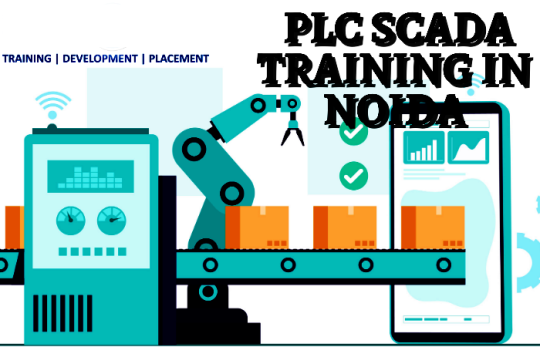
Are you seeking comprehensive PLC SCADA Training in Gurgaon to accelerate your career in industrial automation? Look no further than APTRON Gurgaon, a leading training institute known for its industry-aligned courses and expert guidance. Our PLC SCADA training program in Gurgaon is designed to equip you with in-depth knowledge and practical skills essential in the field of automation. With a focus on hands-on learning, our experienced trainers ensure you grasp the fundamentals and advanced concepts of Programmable Logic Controllers (PLC) and Supervisory Control and Data Acquisition (SCADA) systems.
#PLCSCADA#AutomationTraining#Gurgaon#APTRONGurgaon#IndustrialAutomation#SCADAtraining#PLCtraining#CareerDevelopment#TechEducation#IndustryAlignedCourses#HandsOnLearning#SkillDevelopment#CareerGrowth#AutomationSkills#EngineeringTraining#JobReady#CertificationTraining
0 notes
Text
How to Get CAPM Certification Training Online ?
The Certified Associate in Project Management (CAPM) certification is an excellent starting point for those new to project management or looking to enhance their skills. As an entry-level credential from the Project Management Institute (PMI), it demonstrates your understanding of fundamental project management concepts and practices. If you're considering obtaining CAPM certification, here's a user-friendly guide on how to get CAPM certification training online.
Why Pursue CAPM Certification?
CAPM certification is valuable for those seeking to enter the field of project management or advance their careers. It provides a solid foundation in project management principles, including the Project Management Body of Knowledge (PMBOK) guide, which is essential for effective project execution. Earning this certification can help you stand out to employers, increase your job prospects, and set the stage for further professional growth.
Steps to Get CAPM Certification Training Online
1. Understand the CAPM Requirements
Before enrolling in training, it's crucial to understand the requirements for CAPM certification. To qualify, you need to have either:
- A secondary degree (high school diploma or equivalent) and 1,500 hours of project management experience.
- completed 23 hours of project management coursework prior to the test
Online CAPM training programs typically meet the education requirement and often provide resources to help you gain the necessary project management experience.
2. Choose a Reputable Online Training Provider
Selecting the right online training provider is key to your success. Look for accredited and reputable organizations that offer CAPM training. Ensure the course is PMI-approved and provides comprehensive coverage of the PMBOK guide. Consider these factors:
- Course Content: Ensure the training covers all areas of the CAPM exam, including project management processes, knowledge areas, and techniques.

- Instructor Expertise: Check the qualifications of the instructors. Experienced professionals with practical knowledge can provide valuable insights and real-world examples.
- Reviews and Testimonials: Look for feedback from past students to gauge the quality of the training.
3. Enroll in an Online CAPM Training Course
Once you’ve selected a provider, enroll in their online CAPM training course. Most courses offer flexible scheduling, allowing you to study at your own pace. Online training typically includes:
Video Lectures: Pre-recorded or live sessions covering key topics.
Interactive Modules: Engaging activities and quizzes to reinforce learning.
Study Materials: Access to ebooks, practice exams, and other resources.
4. Prepare for the CAPM Exam
In addition to the training, dedicate time to studying the PMBOK guide and other recommended resources. Practice exams are crucial for understanding the format and types of questions you’ll encounter. Here are some tips for effective preparation:
- Create a Study Plan: Set aside regular study times and break down the material into manageable sections.
- Join Study Groups: Online forums or study groups can provide support and additional resources.
- Use Practice Tests: Familiarize yourself with the exam structure and identify areas where you need improvement.
5. Schedule and Take the CAPM Exam
After completing your training and preparation, schedule your CAPM exam through PMI’s official website. The exam is administered online, offering flexibility in terms of timing and location. Ensure you are well-rested and prepared on exam day.
6. Maintain Your Certification
After earning your CAPM certification, it’s important to maintain it by continuing your education and staying updated with project management practices. CAPM certification is valid for five years, after which you’ll need to renew it by earning Professional Development Units (PDUs).
Benefits of Online CAPM Training
Online CAPM training offers several advantages:
Flexibility: Study at your own pace and on your own schedule, fitting training into your busy life.
Accessibility: Get access to top-notch training resources from any location with an internet connection.
Cost-Effective: Online courses often cost less than in-person classes and eliminate travel expenses.
Conclusion
Getting CAPM certification training online is a convenient and effective way to start your journey in project management. By understanding the requirements, choosing a reputable provider, and committing to thorough preparation, you can successfully earn your CAPM certification and enhance your career prospects. Embrace the flexibility and resources of online learning to achieve your professional goals and make a strong start in the field of project management.
#CAPM#certificationtraining#ProjectManagement#pmicertification#pmi#CAPMTraining#ProjectManagementCertification
0 notes
Text

0 notes
Text
Your Guide to GCP Certification Training Courses: "Mastering the Cloud"
In today's dynamic digital environment, cloud computing has become an essential element for companies looking for flexibility, scalability, and creativity. Google Cloud Platform (GCP), one of the top suppliers in this field, offers a range of effective tools and services to fully utilize the cloud. As more and more companies move their operations to the cloud, there is a growing need for qualified individuals who are knowledgeable about, gcp courses can help with this by giving people the knowledge and certifications they need to succeed in this fast-paced industry.
Unlocking Google Cloud Platform's Potential
A complete cloud computing platform, Google Cloud Platform (GCP) provides a multitude of services for data analytics, machine learning, computing, storage, and other areas. Using Google's extensive global infrastructure and state-of-the-art technology, GCP enables companies of all sizes to develop, launch, and grow applications with ease.
Compute Engine, Kubernetes Engine, BigQuery, TensorFlow, and other services from GCP give professionals the tools they need to take on challenging projects and spur innovation in their fields. GCP offers the essential components for success, whether it comes to developing scalable online apps, carrying out sophisticated data analysis, or putting machine learning models into practice.
GCP Certification's Significance
Having a GCP certification will greatly improve your professional prospects in today's cutthroat job market. GCP certificates attest to your proficiency in cloud computing and certify your ability to design, build, and manage solutions on Google Cloud Platform.
Google provides a variety of certification tests suited to various positions and skill levels, such as:
For those with practical experience installing, monitoring, and maintaining projects on GCP, the Associate Cloud Engineer position is ideal.
Professional Cloud Architect: Designed for seasoned cloud workers in charge of creating and overseeing highly available, secure, and scalable systems on GCP.
Professional Data Engineer: Designed for professionals with a background in data engineering who can show that they can plan, develop, and implement analytics solutions and data processing systems on GCP.
Professional Machine Learning Engineer: Targeting experts in data science and machine learning, this program highlights their prowess in developing and implementing machine learning models on GCP.
Starting Your Path to GCP Certification
Although earning a GCP certification has many advantages, passing these tests needs commitment, knowledge, and in-depth training. In order to succeed in GCP environments, prospective professionals need to have the knowledge, abilities, and practical experience that GCP Certification Training Courses offer.
A top-notch GCP certification training program addresses a broad range of subjects in line with the goals of the test, such as:
Knowing the basic features and services offered by GCP
Deploying and overseeing containers and virtual machines
Constructing dependable and scalable architectures
Putting data processing and storage systems into place
Protecting GCP networks and resources
Creating and implementing models for machine learning
Maximizing GCP's cost control and performance
To reinforce learning and get students ready for the demands of certification tests, these courses frequently incorporate practical labs, real-world projects, and practice exams.
Selecting the Appropriate GCP Certification Course
Choosing the best GCP certification training course might be difficult given the abundance of options available. Take into account the following elements when assessing courses:
Content Quality: Verify that the course covers all pertinent material and complies with the exam's requirements.
Instructor Expertise: Seek out classes instructed by licensed instructors or GCP experts with a lot of experience.
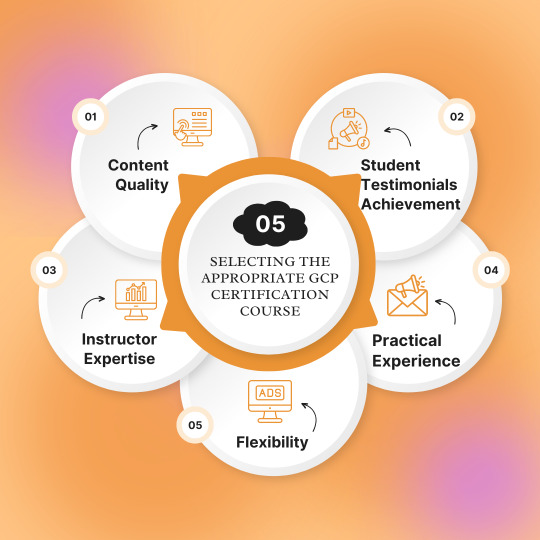
Practical Experience: To enhance learning, choose courses that include hands-on labs and real-world projects.
Flexibility: Select a course mode (instructor-led, self-paced, etc.) based on your learning style and schedule.
Student Testimonials and Achievements: To evaluate the efficacy and applicability of the course, read through reviews and testimonies from previous participants.
In summary
To sum up, gcp cloud training Courses provide a platform for people to become experts on Google Cloud Platform and verify their knowledge with certificates accepted by the industry. In the current digital environment, professionals may promote creativity, scalability, and efficiency by utilizing the extensive tools and services offered by GCP. GCP certification training courses give you the tools and direction you need to be successful in this fast-paced industry, regardless of how experienced you are with cloud computing. With GCP certification training, you can maximize your cloud computing capabilities and advance your career to new heights.
0 notes
Text

Look no further than ERP NOIDA's top-tier SAP BO Training Course in Noida. In today's competitive job market, having expertise in SAP BusinessObjects is a game-changer, and our training program is designed to help you become a certified professional in this field. Let's delve into the details of what makes our course a standout choice for your career advancement.
#SAPTraining#SAPBusinessObjects#ERPNoida#CareerDevelopment#DataAnalysis#CertificationTraining#BusinessIntelligence#SAPCertification
0 notes
Text
Best J2EE Java Training Course in Coimbatore
Java training in Coimbatore is best at Upshot Technologies. We give Real-time Project-Oriented Java Course in Coimbatore with comprehensive course topics briefing, practical training of real-time project situations

0 notes